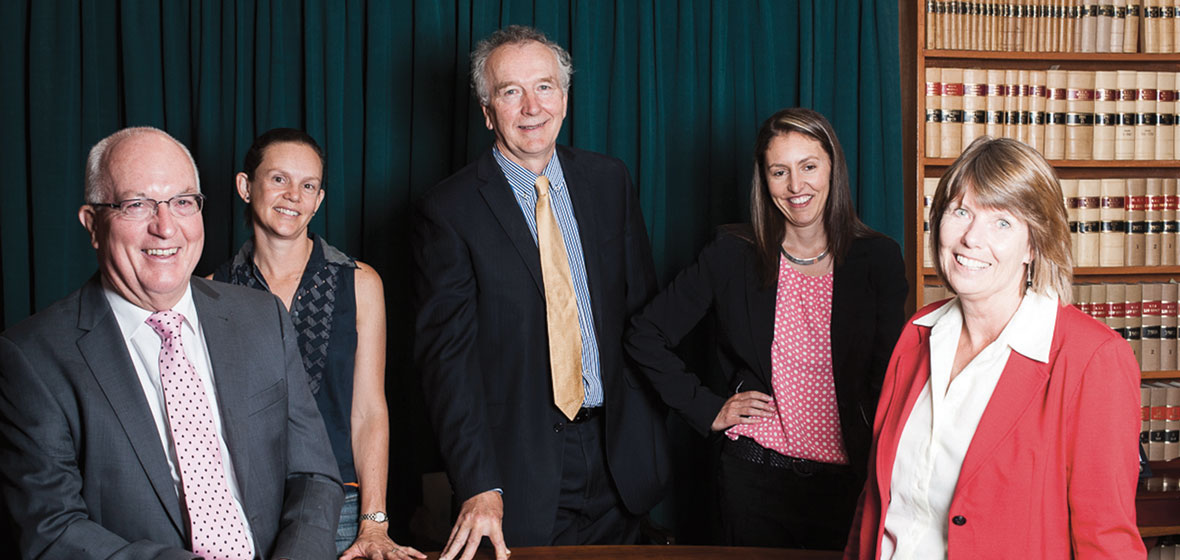Succession planning often ends up in the too-hard basket for small firms and sole practitioners, but there are many good reasons to prepare for the unexpected – or simply for retirement
Even though Vanessa Gibson is as much as 20 years younger than many of her regional law firm’s other partners, she is picking up work previously done by her more senior colleagues. But far from being a problem for her firm, she is helping to futureproof the Gordon Garling Moffitt practice in the small Central West town of Grenfell.
“One of the principals, Peter Moffitt, often says the hardest thing – but the best thing – is when clients he’s worked with for 40 years start making appointments with me instead of him,” says Gibson.
“But I’m not just here to do residential conveyancing day in, day out. If I didn’t get the good stuff, I wouldn’t have stayed.”
Gibson’s future seems clear, but for many small firms and sole practitioners, her story is almost an anomaly.
According to the 2016 Australasian Legal Practice Management Association (ALPMA) and InfoTrack survey, ‘Adapting to the Changing Legal Landscape’, released in August, “succession planning was the most common ‘people-related’ issue for firms [42 per cent of respondents] – with this particularly affecting small- to medium-sized firms, where 70 per cent nominated this as an issue.”
However, just 14 per cent of firms are actively seeking solutions.
The problem of succession planning is nothing new.
A similar ALPMA survey in 2013 identified it as a critical issue for smaller firms, and RMIT University found a decade ago that three-quarters of small legal firms had no plans for protecting their future viability.
“Succession planning is a continuing issue,” ALPMA president Andrew Barnes says.
“Each generation doesn’t worry about it until retirement is upon them.
“It’s not like in sport where people realise that once they hit 32, the game’s up and they disappear.
“These are people who at an intellectual level might still be able to contribute, but other factors are telling them it’s time.”
Moffitt, who is a third-generation lawyer in Grenfell, undoubtedly is keenly aware of how the unexpected can lay waste to the best plans.
“Peter’s father literally died at his desk,” says Gibson. “I have to remind Peter that I’m here so he doesn’t do that.”
Gibson, a Riverina local who worked in Sydney and Canberra after studying law in Armidale, believes partners and principals of law firms need to start the succession planning process 15 years before they intend to retire.
Gibson was only 34 when she became partner, the next youngest partner was in her forties and the rest of the partners were aged around 60.
“I would never have bought in if I’d thought that Peter wasn’t going to be around in the transition phase,” says Gibson.
“He’s my mentor and if he wasn’t here or I didn’t think he was going to be here for a period of time, I would never have bought in.”
Gibson had a flexible equity arrangement that smoothed the transition to becoming a partner.
From her experience, she believes one of the biggest factors is investing heavily in likely successors at work and helping them integrate in the community, especially in suburban or regional practices.
“I don’t know anyone who has done it as well as Peter has – making me part of the community,” she says.
“This is where a lot of firms go wrong. When you bring someone new in, you can’t be looking out of the corner of your eye waiting for them to go into competition with you.
“You have to teach them everything you know, impart that knowledge so they value your relationship with them. Peter did that from day one.
“Even if I wanted to go across the road and open up in competition, I wouldn’t do that because of the relationship.
“I know a lot of other firms that give their graduates the mundane work to do and don’t let them near the good clients until they see if they’re going to stick around. It doesn’t work in reverse.
I would never have bought in if I’d thought that Peter wasn’t going to be around in the transition phase. He’s my mentor and if he wasn’t here or I didn’t think he was going to be here for a period of time, I would never have bought in.
VANESSA GIBSON, Godon Garling Moffitt, at Grenfell
“You have to make them part of the team from the beginning.”
There are arguably more factors in play today than at any time in the past.
As the baby boomer generation moves through the retirement phase, a crop of millennials is arriving with a markedly different approach to a legal career.
In many cases, they don’t see joining a law firm as a life-long decision. Nor are they as willing to stump up a large amount of equity to enter a firm.
“If you entered equity 20 years ago, you might have thought you knew how it was going to play out because that was the way it had always happened,” says Barnes.
“Not any more. For generations in their early 30s, the pressure of children, schools and mortgages means going to the bank to find money for a partnership is less desirable these days.”
Fewer buyers also creates a backlog of lawyers wanting to get out but who can’t get the price they want.
“And on the flipside, there are some that don’t want to get out but the choice is regrettably not theirs and this can be because of family or health pressures or the firm simply changing course,” says Barnes.
Beyond questions of equity and valuation of goodwill, succession planning has also been complicated by lower barriers to entry thanks to technological changes and the number of law graduates entering a market that many believe is already fully serviced.
All of which ultimately affects the profitability of a practice.
“Succession planning is largely a question of fiscal responsibility,” says Anne-Marie Foord, Manager of Professional Standards at the Law Society of NSW.
“And that comes back to ensuring your practice is financially viable.
“You have to be able to draw a reasonable salary from the practice as well as pay overheads and comply with your taxation obligations.”
The longer a manager is in there trying to sort out the files, the more we have to take from the business.”
ANNE-MARIE FOORD, Manager of Professional Standards, Law Society of NSW
The Law Society website has a page devoted to succession planning.
Foord, whose role includes appointing managers to wind-up practices, believes practitioners should think about succession planning when they set up in business.
“You have to make decisions about super with your first job, and it’s no different for sole practitioners or small firms,” she says.
Foord suggests that small firms or sole practitioners consider having an agreement with another solicitor in the area as a buffer against the unexpected.
If a manager has to be appointed, by law all the costs are recovered from the practice.
“The longer a manager is in there trying to sort out the files, the more we have to take from the business,” she says.
“Like everything else, if you have dependents, a family and people you’re responsible for, you’ve left it too late if you’re diagnosed with cancer or a terminal illness.
Life insurance and income protection are part of financial planning and should be considered when establishing the practice.”
Rod Cunich, a solicitor in Sydney, believes profitability goes to the heart of succession planning.
“It’s always been hard for a sole practitioner to sell a practice,” he says.
“If the clients are geographically based, for example in a rural town or suburb, then someone may pay you money for the goodwill. If a practice is profitable, then it is attractive as an investment – that factor hasn’t changed.”
As generational and technological changes buffet many ageing practitioners, Cunich tends towards a realistic view of the end.
“My cynical view is that you make hay while the sun shines and you don’t count on your practice having any value,” he says.
“If you manage to sell it to someone, it’s more good luck than anything else.”
Nevertheless, 61-year-old Cunich has taken a perhaps more innovative approach to succession than others.
He has joined Keypoint, a law firm that provides the infrastructure and colleagues of a traditional firm, but enables its senior lawyers to work with considerable autonomy.
Lawyers earn most of what they bill, with the firm retaining a fixed percentage of what Cunich bills to cover services such as office and meeting space and secretarial and accounting services.
Other lawyers also use this arrangement, which has other benefits.
“If I bring work in to another lawyer because it doesn’t fit with what I do, I get a share of the fees,” says Cunich.
“When I retire, for a period of time, I will continue to get a portion of the fees for any of my clients other lawyers look after.
“It’s the equivalent of being paid a goodwill sum and in a sense is much fairer than taking the money from someone for the practice with no guarantee that the clients will




